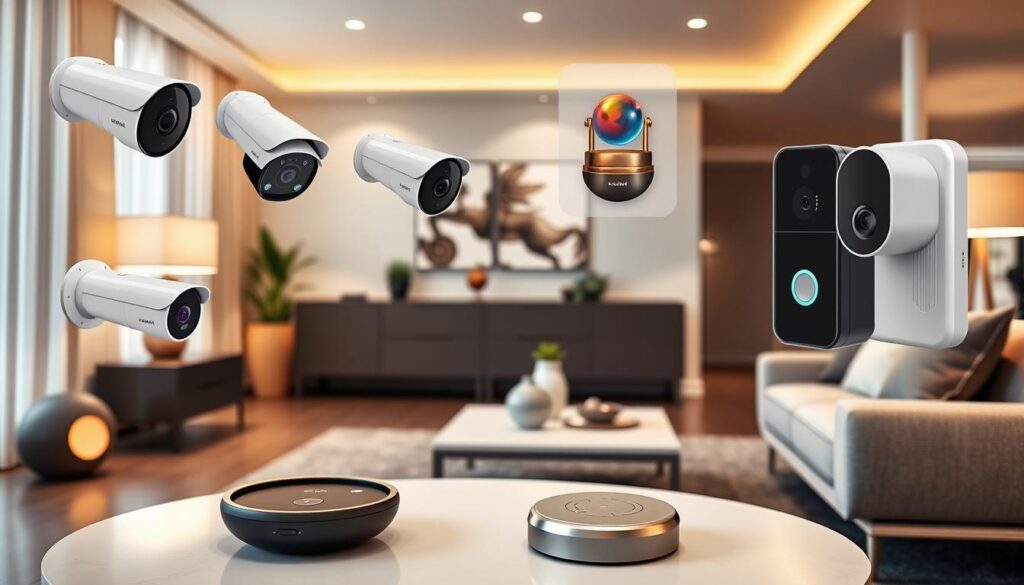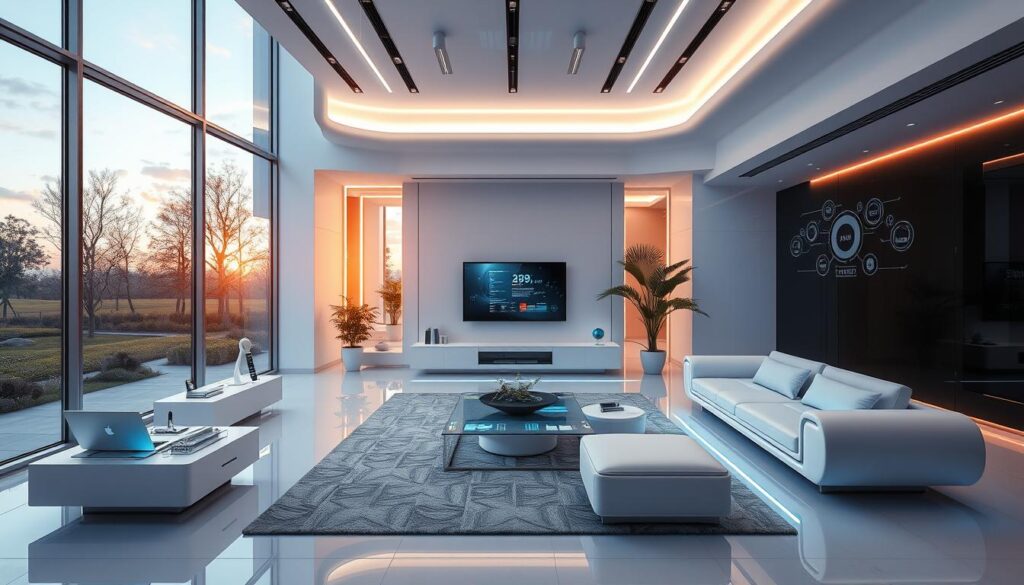The world of modern living is changing fast, thanks to smart home technology. Home automation, powered by the Internet of Things (IoT) and voice assistants, is changing how we live. It makes controlling our homes easy, saves energy, and boosts security.
At the heart of this change are new technologies in our homes. Voice assistants like Amazon’s Alexa and Google Assistant let us control our homes with just our voice. The IoT connects our devices, making our homes work together smoothly.
Smart homes are also great for saving energy. Smart thermostats and lights help us use less power. This not only saves money but also helps the planet.
Smart homes offer more than just convenience and savings. They also have top-notch security features. With remote access and AI, we can keep our homes safe, even when we’re not there.
The future of smart homes looks even brighter with AI. AI will make our homes even more personalized, meeting our needs before we even ask. The future is all about making our homes more convenient, energy-efficient, and secure.
Key Takeaways
- Smart home technology is transforming modern living through innovative automation and interconnected devices.
- Voice assistants, the Internet of Things (IoT), and artificial intelligence (AI) are the driving forces behind the smart home revolution.
- Smart homes offer enhanced energy efficiency, improved security, and increased convenience for homeowners.
- The integration of AI in smart homes promises to deliver even more personalized and anticipatory living experiences.
- The future of smart homes is poised to redefine the way we interact with and experience our living spaces.
The Rise of Smart Homes: How Automation is Redefining Modern Living
Technology keeps getting better, making smart homes a fast-growing reality. Smart home technology and home automation systems are changing how we live and work. They use Internet of Things (IoT) devices and artificial intelligence (AI) to make homes smarter and more connected.
More people can now afford and use IoT devices easily. These devices let homeowners control and check on their homes from anywhere. They can change lights, adjust the temperature, check on security, and more. This makes life easier and helps save energy.
AI-powered voice assistants and machine learning have made smart homes even smarter. Homeowners can control their homes with just their voice. The system learns their habits and preferences, making their home truly their own.
“The smart home revolution is about more than just convenience – it’s about transforming the way we live, work, and interact with our environments.”
The future of smart home technology looks even brighter. Homes will soon be even more connected and efficient. They will adapt to our needs, changing the way we live today.
Home Automation: The Backbone of Smart Homes
The digital revolution has changed how we live, making home automation key. It lets us control our homes easily. This makes our living spaces better.
Voice Assistants: Revolutionizing Home Control
Voice assistants have changed home control a lot. They let us control our homes with just our voice. This includes lights, temperature, and more.
They make our lives easier and more efficient. We can do things without lifting a finger.
Interconnected Devices: The Internet of Things (IoT)
The Internet of Things (IoT) is at the heart of smart homes. It connects devices so they can talk to each other. This lets us manage our homes better.
We can control things like energy use and security. The IoT is growing, adding more devices to our homes. This makes our homes smarter and more responsive.
“The future of home automation lies in the seamless integration of voice assistants and the Internet of Things, creating a truly intelligent and responsive living experience.”
Home automation is getting better. Soon, our homes will adapt to our needs. This will make our lives more efficient, comfortable, and safe.
Energy Efficiency: Smart Homes Leading the Way
Smart home technology is playing a big role in saving energy. It combines advanced automation and smart systems. This lets homeowners control their energy use better than ever.
Smart thermostats are key to this change. They learn your habits to adjust heating and cooling. They adjust based on when you’re home, the time, and the weather. This means energy is only used when it’s needed.
With energy monitoring systems, you can see how much energy you use in real time. This helps you make choices to lower your environmental impact.
But smart homes do more than just manage energy. They also support renewable energy like solar panels and home batteries. These systems work with smart tech to optimize energy use. This leads to savings and less harm to the environment.
| Feature | Benefit |
|---|---|
| Smart Thermostats | Automated temperature control based on occupancy, time, and weather |
| Energy Monitoring Systems | Real-time data on energy usage for informed decision-making |
| Renewable Energy Solutions | Reduced reliance on the grid and decreased environmental impact |
As smart home tech gets better, so does energy efficiency. Homeowners can save money, cut down on carbon emissions, and help create a greener future.
Smart Home Security: Safeguarding Your Sanctuary
In today’s world, keeping your home safe is more crucial than ever. Smart home security systems are a top-notch way to protect your home. They use the latest tech and make it easy to keep an eye on your place.
With remote access and AI surveillance, you can watch over your home anytime. This means you can see what’s happening live, get alerts for any odd activity, and even control your lights and locks. It’s all about keeping your family and stuff safe.
Remote Access: Keeping an Eye on Your Home
With smart home security, you can check on your home from anywhere. Whether you’re at work, out running errands, or on vacation, you’re just a tap away. You can see what’s happening, get alerts, and even control your home’s systems.
This lets you act fast if something looks off. It gives you peace of mind and control over your home’s safety.
AI-Powered Surveillance: Intelligent Home Protection
AI has changed how we protect our homes. These systems use smart tech to spot intruders and tell the difference between real threats and nothing to worry about. They send alerts that are just right for you, so you only get notified when it really matters.
This smart watching keeps burglars away and helps you act fast if there’s a problem. It keeps your home and family safe.
| Feature | Benefit |
|---|---|
| Remote Access | Ability to monitor your home from anywhere, providing peace of mind and quick response to security concerns. |
| AI-Powered Surveillance | Intelligent analytics that accurately detect and differentiate threats, ensuring timely and appropriate security responses. |
| Integrated Smart Home Automation | Seamless control over home security, lighting, locks, and other connected devices, enhancing overall home protection. |

The smart home revolution brings a new level of security. It uses tech to keep your home safe. With remote access and AI, smart home systems offer top-notch protection. They let you control and protect your home, even when you’re not there.
Convenience at Your Fingertips: Smart Home Living
Welcome to the world of smart home living, where convenience meets automation. Today, smart devices and routines change how we do our tasks.
Automated Routines: Simplifying Daily Tasks
Imagine a home where you can control everything with just your voice or a tap on your phone. Smart home living makes this possible. It helps us do our daily tasks faster and saves us time.
- Voice-activated commands for seamless home control
- Automated routines that adapt to your preferences
- Scheduling and timing features to ensure your home is always ready
- Integrated devices that work together to enhance convenience
With smart home technology, managing devices becomes easy. Say goodbye to the stress of handling many devices. The future of smart home living is here, changing our daily lives.
“Smart home living is not just about convenience – it’s about reclaiming the time and energy we often spend on mundane tasks, allowing us to focus on what truly matters.”
Smart home living lets you automate lights, climate, security, and entertainment. The options are endless. Dive into smart home living and feel the real convenience at your fingertips.
The Future of Smart Homes: Artificial Intelligence (AI) Integration
Smart home technology is getting better, thanks to artificial intelligence (AI). This new mix will make homes smarter and more personal. They will adjust to what we like and need.
AI will predict what we want and need, making our homes more convenient. It will change the temperature, lights, and even suggest what to watch. This makes our homes more comfortable and tailored to us.
Voice control will also become a big part of smart homes. We’ll be able to talk to our homes to do things like turn on the lights or lock doors. It’s all about making life easier without lifting a finger.
| Feature | Description |
|---|---|
| Predictive Analytics | AI-powered systems that can anticipate user needs and preferences, automatically adjusting the home environment accordingly. |
| Voice Control | Advanced voice recognition and natural language processing enabling hands-free control of smart home devices. |
| Personalized Experiences | Intelligent systems that learn user habits and preferences to provide tailored, seamless experiences in the home. |
AI is changing how we live in our homes. It’s making our homes more intuitive and personal. This is the start of a new era in smart home living.

“The future of smart homes lies in the seamless integration of artificial intelligence, transforming our living spaces into adaptive, personalized havens that anticipate our needs and preferences.”
Smart Home Challenges: Privacy and Cybersecurity Concerns
Smart home tech is changing how we live, but it also raises privacy and security issues. The ease of connected devices and remote access can lead to data breaches. Homeowners need to be careful to keep their homes safe and private.
Securing Your Smart Home: Best Practices
To keep your smart home safe, you need to take action. Here are some steps to follow:
- Always update your smart home devices and software to stay secure.
- Use strong, unique passwords for each device and two-factor authentication when you can.
- Think about what you share with voice assistants and other devices, as they may keep your data.
- Use encryption and secure networks to protect your wireless setup from cyber threats.
- Research and check any third-party apps or services before letting them into your network or data.
By following these smart home security best practices, you can enjoy the benefits of smart tech while keeping your privacy and security safe.
| Smart Home Challenge | Potential Impact | Recommended Solution |
|---|---|---|
| Data Privacy | Unauthorized access to personal information, such as browsing history, voice recordings, and user preferences | Carefully manage device permissions, utilize encryption, and limit data sharing with third-party services |
| Cybersecurity Vulnerabilities | Hacking attempts, malware infiltration, and potential remote control of smart home devices | Regularly update software, use strong passwords, and implement two-factor authentication |
| Lack of Standardization | Compatibility issues and challenges in integrating diverse smart home devices from different manufacturers | Research and invest in smart home systems with a focus on interoperability and industry-wide standards |
“As our homes become more connected, it’s essential that we prioritize the security and privacy of our personal data. Homeowners must remain vigilant in protecting their smart home environments.”
Smart Home Trends: What’s Next in Home Automation?
The smart home revolution is growing, bringing new possibilities. Voice control will get even better, making it easier to manage your home. You’ll be able to use natural language to control everything.
Predictive maintenance is also on the rise. Smart homes will use AI and machine learning to spot problems before they happen. This means your appliances and devices will work better for longer.
Renewable energy solutions like solar panels and energy storage systems will become more common. This mix of smart tech and green energy will cut down on energy use. It will also help homeowners reduce their environmental impact, leading to a greener future.

